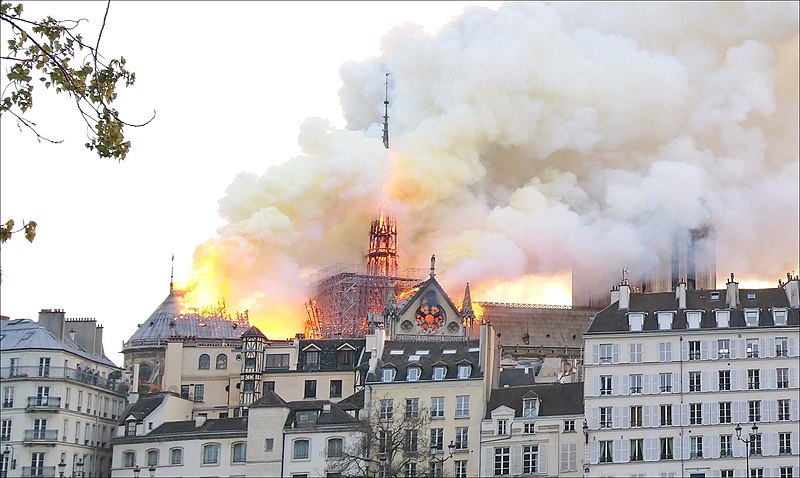Philip Tallon ~ Make Buildings that Won’t Be Burnt Up

A wise art teacher used to say, “Make art that won’t be burnt up.” He meant, make art that will outlast the last judgment. Make art that will count as one of the “glories of the nations” brought into the New Jerusalem (Rev. 21:26).
Like most people, I watched in horror as one of the glories of the nation of France was nearly burnt up last week. Someone put it well in Twitter, “Had to turn the tv off. Can’t take it anymore. Like watching someone in real time smashing everything in the Louvre with a sledgehammer.”
The world mourned in real time, only to discover in the following days that much of value survived. An early echo of Easter’s surprising good news, the medieval vaulting protected the sanctuary from much of the fire. If it were not for the much later addition of the spire, the damage to the inside would have been even less. My children will get to see Notre Dame’s sanctuary in much the same state as I have.
The news made much of the response of the French people. The French are marginally church-going and the country ranks as one of the least religious in the world. It is easy to imagine that France will be, in the near future, more meaningfully Muslim than Christian. Yet the world, and the French people, love this cathedral. In many ways it is the heart of Paris.
As the burning was happening I, of course, noticed the occasional dunking on church-obsession by Christians and secularists, for opposite reasons. The Christians looked to score piety points by signaling that “the church is people, not buildings.” The secularists signaled superiority by (often mistakenly) noting that such churches were built on the scaffolding of injustice, superstition, and colonialism. There wasn’t much of this, though. It was mostly a unifying moment.
My thoughts turned to my own town. I wondered what sites here in Houston would warrant such an outcry with their bloodless destruction. The answer was easy: none. Few such places exist in the world. Few buildings are as grand or as famous as Notre Dame. The closest Houston comes to a landmark is its sad, abandoned Astrodome, which the city can’t bring itself to get rid of, but also has no use for. Our dome will never compare to “Our Dame.” We could try awfully hard and still fail to create such a work of beauty. There is, of course, the additional problem that we aren’t trying.
This week it so happened that I had the pleasure to lead a discussion on Burke’s Reflections on the Revolution in France. As anyone familiar with the work will recall, much of what Burke bemoans is the way that the French revolution cut out the heart of civil life: the nobility and the church. Left with denuded rationality, Burke foresaw the likely result. Reason unaided by sentiment will quickly degrade into cruelty. And Burke was right. The reign of terror followed soon after the book’s publication. Despite its coincidental bearing on France, the part of the book that touched most directly on the burning of Notre Dame was a point that Burke made with reference to manners: “There ought to be a system of manners in every nation which a well-formed mind would be disposed to relish. To make us love our country, our country ought to be lovely.” The connection here between beauty and loyalty is apparent. Beauty attracts us, even when our reasons are unconvinced. When our nation’s politicians act in ugly ways, it helps that our nation’s capital is still beautiful.
The connection to Notre Dame is obvious. This troubled world still hungers for beauty, even as it has become confused about truth. On cloudy days it seems like the church only cares about truth and goodness (and sometimes not even those), but has left the beautiful to fend for itself. Our love of “Our Lady” reminds us of a truth that the builders knew: to help us love God the church ought to be lovely.